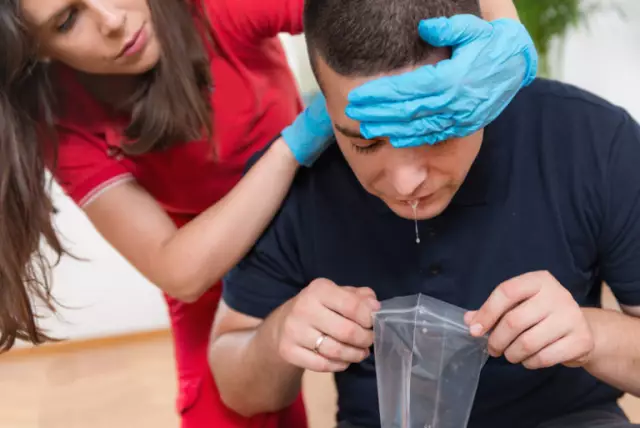- Author Rachel Wainwright [email protected].
- Public 2023-12-15 07:39.
- Last modified 2025-11-02 20:14.
Bleached poisoning
Belena (popular names: blekota, mad grass, dope grass, rabies, toothbrush, scab, witch's grass) is a one- or two-year-old herb of the nightshade family. It is widespread, which is explained by its high fertility (on average, up to 10,000 seeds ripen from one plant). Helen is outwardly inconspicuous and unpretentious, grows along roads, near the walls of buildings, in landfills, and is found in gardens.

Source: depositphotos.com
A distinctive feature that allows you to recognize henbane - large bell-shaped flowers of an off-white or yellowish color. The core of the flower is dark, almost black, and the petals are covered with purple spider-like veins. Has an unpleasant sweetish odor.
Belena has long been used as a medicinal plant. It is included in the composition of antispasmodic and analgesic drugs, drugs for the treatment of diseases of the gastrointestinal tract, respiratory, nervous and cardiovascular systems in both official and non-traditional, homeopathic medicine.
Helen is a powerful hallucinogen (due to its psychotropic neurotoxic effect), which allows it to be classified as an extremely poisonous plant. All parts are poisonous, but the roots and seeds are especially dangerous. Toxicity is due to the presence of highly active plant alkaloids in the henbane: hyoscyamine (isomer of atropine), atropine, scopolamine (traces), hyoscerol.
How does bleached poisoning occur?
The greatest number of poisonings occurs in the spring (April-May), when the soil is dug up, and henbane is confused with the roots of parsnip and parsley, since they are very similar in appearance.
Poisoning is also possible if young henbane shoots are accidentally eaten during flowering (when alkaloids are most active) or its seeds.
The henbane is a great danger for children who are attracted by the unusual type of plant. Often children eat a juicy and sweet-tasting root, mistaking it for white carrots, or seeds similar to poppy seeds.
Poisoning can occur when collecting and harvesting henbane as a medicinal raw material when working without gloves and goggles.
Poisoning symptoms
Bleached poisoning differs in severity, because it depends on the accompanying factors: food intake before or after eating henbane, the amount of toxin that has entered the body, the age and weight of the victim.
In case of mild poisoning, the first signs of intoxication appear after 10-30 minutes:
- thirst, dryness in the oropharynx;
- hyperemia and dryness of the skin;
- hoarseness of voice, up to temporary loss (aphonia);
- difficulty swallowing;
- persistent pupil dilation, mirror-like shine of the eyes;
- visual impairments (near vision disorder, defocusing, double vision, photophobia);
- frequent irregular pulse;
- dizziness, intense headache;
- slurred, indistinct speech;
- motor and neuropsychic agitation;
- delusions and hallucinations.
After the provision of medical care, the symptoms of motor and neuropsychic arousal, as a rule, stop, and a secondary narcotic sleep sets in. After waking up, the victim's condition improves, recovery occurs.
A spontaneous improvement in the condition is possible if a small amount of toxin is taken and first aid is provided immediately after poisoning.
In severe poisoning, the symptoms are more pronounced, signs of damage to the central nervous system and the cardiovascular system prevail:
- loss of orientation in time and space;
- sharp uncontrolled psychomotor agitation;
- an abrupt increase in body temperature to febrile digits;
- cyanosis of the skin;
- shallow breathing;
- arrhythmic pulse of weak filling;
- drop in blood pressure;
- convulsions;
- loss of consciousness, development of coma.

Source: depositphotos.com
First aid for bleached poisoning
- If you suspect poisoning with bleached, you must immediately call the ambulance team.
- Psychoemotional and physical rest.
- Gastric lavage (drink 1-1.5 liters of a weak solution of potassium permanganate or a suspension of activated carbon and induce an emetic urge by pressing on the root of the tongue) to clean wash water.
- Reception of enterosorbents (Enterosgel, Activated Carbon, Polyphepan, Polysorb MP).
- Taking a saline laxative (magnesium sulfate).
- With severe hyperthermia, an antipyretic agent (Ibuprofen, Paracetamol, Ibuclin).
When is medical attention required?
Medical assistance in case of bleached poisoning is required. Even with mild poisoning, a sudden deterioration in health is possible, when the satisfactory condition of the victim spontaneously turns into a more severe one, up to the development of coma and death.
In a specialized hospital, detoxification therapy and symptomatic treatment are carried out, aimed at alleviating the patient's condition and restoring body functions.
Possible consequences
In the absence of timely medical care, severe poisoning with henbane alkaloids, as a rule, ends with the death of the victim from paralysis of the respiratory center or vascular insufficiency.
With timely treatment, the outcome is usually favorable, but recovery can take a long period. Disorders of the nervous system are especially persistent.
Prevention
To prevent bleached poisoning, you must:
- carry out all garden work using personal protective equipment;
- destroy henbane growing near children's playgrounds, preschool and school institutions;
- strictly follow the recommendations of the attending physician when taking medications containing henbane components;
- do not prepare medicines containing henbane components on your own at home;
- do not eat unfamiliar plants.
YouTube video related to the article:

Olesya Smolnyakova Therapy, clinical pharmacology and pharmacotherapy About the author
Education: higher, 2004 (GOU VPO "Kursk State Medical University"), specialty "General Medicine", qualification "Doctor". 2008-2012 - Postgraduate student of the Department of Clinical Pharmacology, KSMU, Candidate of Medical Sciences (2013, specialty "Pharmacology, Clinical Pharmacology"). 2014-2015 - professional retraining, specialty "Management in education", FSBEI HPE "KSU".
The information is generalized and provided for informational purposes only. At the first sign of illness, see your doctor. Self-medication is hazardous to health!






